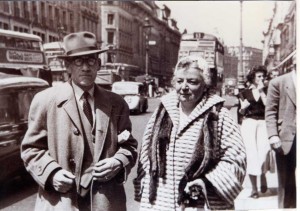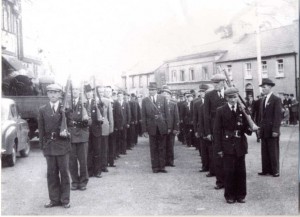‘Rising. No rent paid!’
Published in
Uncategorized

My maternal grandmother, Moya Corcoran, and her husband, P.J. A member of the Royal Dublin Society, she regarded London as the centre of civilisation.
My first memory of 1916 is of being beaten for not being able to name the signatories of the Proclamation, a less effective method of inculcating patriotism than our elderly schoolteacher assumed. Growing up in Bray, Co. Wicklow, the meaning of 1916 was absorbed through other, not particularly ideological, perspectives. Playing with my cousin in the dilapidated Victorian house owned by my maternal grandmother, a member of the Royal Dublin Society who regarded London as the centre of civilisation, we discovered a rent-book for one of the inner-city tenements she had inherited from her father. Turning to the records for April 1916, we found scrawled across the page: ‘Rising. No rent paid!’, an entry conveying something of the Rising’s impact on ‘Castle Catholics’. A framed postcard of Michael Collins on her mantelpiece testified to the family’s accommodation to the new realities ushered in by the Rising, although she recalled vivid—if probably not direct—memories of soldiers killed during Easter Week.

My paternal grandfather, Mick McGarry (centre), inspecting Old IRA comrades at a 1916 commemoration in Bray, Co. Wicklow, in the 1950s.
My paternal grandmother, who lived in a terraced house in a working-class part of Bray, came from a republican family. Her Fenian husband, Mick, had helped land rifles at Howth, and led the IRA’s campaign in the revolutionary backwater of Bray. Among the family papers is a notebook of press cuttings from the revolutionary period, compiled by his mother, which begin with the executions of 1916, and an almost entirely faded photograph of my grandfather in Rath internment camp. Although his pride in his activism seems evident from a photograph of him drilling elderly comrades in a re-enactment of the Rising in the 1950s, his children have no recollection of him discussing the conflict. Nor was the fact that the families took opposing sides in the Civil War mentioned when both grandmothers met. Most Irish families have similar stories, illustrating how the political abstractions of the period were subsumed into everyday life and how the legacy of 1916 was shaped by forgetting as well as by remembering, by generational memory, and by differences between public and private forms of remembering.
Above: My maternal grandmother, Moya Corcoran, and her husband, P.J. A member of the Royal Dublin Society, she regarded London as the centre of civilisation.
Below: My paternal grandfather, Mick McGarry (centre), inspecting Old IRA comrades at a 1916 commemoration in Bray, Co. Wicklow, in the 1950s.


















